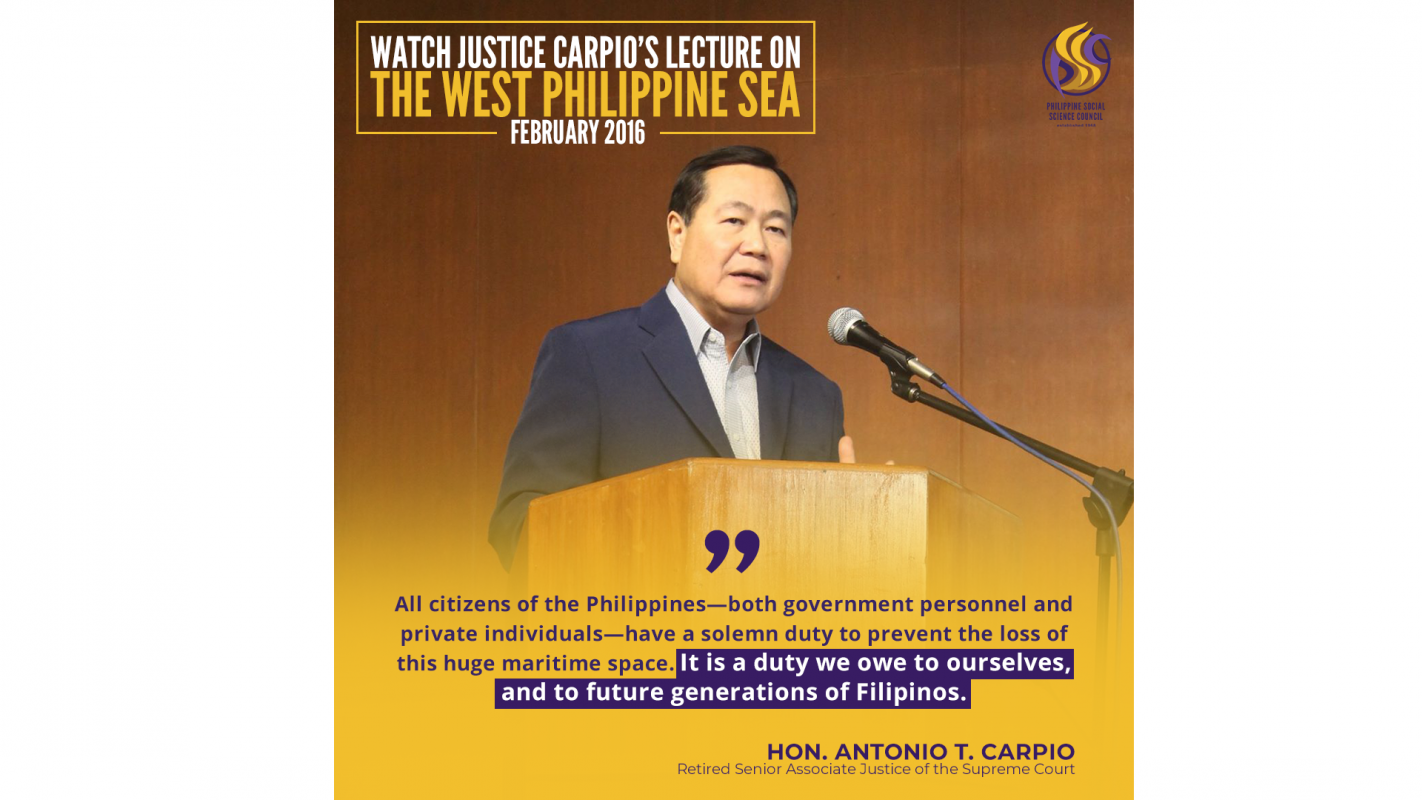West Philippine Sea Lecture by Retired Supreme Court Senior Associate Justice Antonio Carpio
- Posted on

In this four-part lecture organized by the Philippine Social Science Council in February 2016, retired Supreme Court Senior Associate Justice Antonio T. Carpio laid the historical and legal narratives behind the opposing maritime claims of the Philippines and China on the South China Sea (SCS).
The first part featured a detailed account of China’s creeping expansion in SCS despite its fake historical claim on its islands and waterways, which affected even the livelihood of Filipino fishermen.
Parts two and three delved on why the Permanent Court of Arbitration should invalidate China’s “nine-dash line” claims on the entire SCS, including parts of the West Philippine Sea (WPS). The Court would later issue its landmark decision in July 2016 declaring that the Philippines has exclusive sovereign rights over the WPS under the United Nations Convention of the Law of the Sea (UNCLOS).
Justice Carpio, in the last part, stressed the importance of the SCS in the geopolitical scene, being the most important waterway and source of maritime resources such as fisheries, gas, and minerals. He highlighted the crucial step to assert and uphold the rule of law as embodied in the UNCLOS.
“The Philippines today is engaged in a historic battle to defend over 531,000 square kilometers of its maritime space in the West Philippine Sea, an area larger than the total land area of the Philippines of 300,000 square kilometers,” said Justice Carpio.
“All citizens of the Philippines—both government personnel and private individuals—have a solemn duty to prevent the loss of this huge maritime space. It is a duty we owe to ourselves, and to future generations of Filipinos.”
In this four-part lecture organized by the Philippine Social Science Council in February 2016, retired Supreme Court Senior Associate Justice Antonio T. Carpio laid the historical and legal narratives behind the opposing maritime claims of the Philippines and China on the South China Sea (SCS).
The first part featured a detailed account of China’s creeping expansion in SCS despite its fake historical claim on its islands and waterways, which affected even the livelihood of Filipino fishermen.
Parts two and three delved on why the Permanent Court of Arbitration should invalidate China’s “nine-dash line” claims on the entire SCS, including parts of the West Philippine Sea (WPS). The Court would later issue its landmark decision in July 2016 declaring that the Philippines has exclusive sovereign rights over the WPS under the United Nations Convention of the Law of the Sea (UNCLOS).
Justice Carpio, in the last part, stressed the importance of the SCS in the geopolitical scene, being the most important waterway and source of maritime resources such as fisheries, gas, and minerals. He highlighted the crucial step to assert and uphold the rule of law as embodied in the UNCLOS.
“The Philippines today is engaged in a historic battle to defend over 531,000 square kilometers of its maritime space in the West Philippine Sea, an area larger than the total land area of the Philippines of 300,000 square kilometers,” said Justice Carpio.
“All citizens of the Philippines—both government personnel and private individuals—have a solemn duty to prevent the loss of this huge maritime space. It is a duty we owe to ourselves, and to future generations of Filipinos.”
In this four-part lecture organized by the Philippine Social Science Council in February 2016, retired Supreme Court Senior Associate Justice Antonio T. Carpio laid the historical and legal narratives behind the opposing maritime claims of the Philippines and China on the South China Sea (SCS).
The first part featured a detailed account of China’s creeping expansion in SCS despite its fake historical claim on its islands and waterways, which affected even the livelihood of Filipino fishermen.
Parts two and three delved on why the Permanent Court of Arbitration should invalidate China’s “nine-dash line” claims on the entire SCS, including parts of the West Philippine Sea (WPS). The Court would later issue its landmark decision in July 2016 declaring that the Philippines has exclusive sovereign rights over the WPS under the United Nations Convention of the Law of the Sea (UNCLOS).
Justice Carpio, in the last part, stressed the importance of the SCS in the geopolitical scene, being the most important waterway and source of maritime resources such as fisheries, gas, and minerals. He highlighted the crucial step to assert and uphold the rule of law as embodied in the UNCLOS.
“The Philippines today is engaged in a historic battle to defend over 531,000 square kilometers of its maritime space in the West Philippine Sea, an area larger than the total land area of the Philippines of 300,000 square kilometers,” said Justice Carpio.
“All citizens of the Philippines—both government personnel and private individuals—have a solemn duty to prevent the loss of this huge maritime space. It is a duty we owe to ourselves, and to future generations of Filipinos.”
